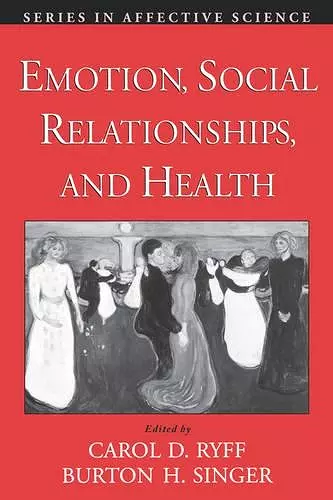Emotion, Social Relationships, and Health
Carol D Ryff editor Burton Singer editor
Format:Paperback
Publisher:Oxford University Press Inc
Published:24th May '01
Currently unavailable, and unfortunately no date known when it will be back

A growing literature, on humans and animals, documents linkages between social integration and affiliative relationships and a variety of health and disease outcomes,including mortality. The actual mechanisms through which these efforts occur are, however, not well understood. Emotion likely plays a central role in mediating connections between relational experiences, underlying neurobiological processes, and health outcomes. Many prior studies have focused on the size and proximity of social networks, thereby neglecting their emotional features. When studied, emotion in social relationships has also been heavily weighted on the side of negative and conflictual interactions, thus giving minimal attention to the possible protective benefits of enduring love, nurturance, and affection. This volume brings together, for the fist time, these differing lines of inquiry to advance understanding of how emotion in significant social relationships influences health. The collection integrates knowledge from those with expertise in mapping the nature of emotional experience in human relations with those who are linking social ties to health outcomes, and those who explicate underlying neurobiological mechanisms. A main message of the book is that full explication of how emotion, social relationships, and health are woven together demands multidisciplinary inquiry. To this end, the volume brings together leading experts from fields of affective science, clinical and social psychology, epidemiology, psychiatry, psychoneuroimmunology, psychoneuroendocrinology, and health to promote the above synthesis. Some address how to formulate, observe, and evaluate social interactions inclinical, laboratory, or daily life contexts. Others link emotional experience in significant social relationships to health outcomes or intervening biological parameters. Still others manipulate social environments or exposure to health challenge to assess impact on respiratory infections and immune function. Collectively, each contributes different pieces to the larger puzzle that connects emotion in social realtionships to health. Recurrent themes include the importance of attending to: (1) both positive and negative emotional experience in significant social reltionships and how they influence underlying mechanisms; (2) cumulative emotional experience--namely, the repeated, chronic nature of socioemotional experience (both positive and negative); (3) gender differences in how emotion in social relationships is experienced and how it effects underlying mechanisms involved in helath outcomes; and (4) the need for multiple methodologies to advance the emotion, socal relationships, and health agenda.
"Papers and commentary from the 1997 Third Annual Wisconsin Symposium on Emotion delve into the nature of emotional interaction with significant others and its role in illuminating the established ties between social relationships and health. Contributors from the fields of affective science, clinical and social psychology, epidemiology, psychoneuroimmunology, and health address how to observe and evaluate social interactions in clinical, laboratory, or daily life contexts, and link emotional experience to health outcomes. Ryff teaches psychology at the University of Wisconsin. Singer is affiliated with the Office of Population Research."--SciTech Book News "Papers and commentary from the 1997 Third Annual Wisconsin Symposium on Emotion delve into the nature of emotional interaction with significant others and its role in illuminating the established ties between social relationships and health. Contributors from the fields of affective science, clinical and social psychology, epidemiology, psychoneuroimmunology, and health address how to observe and evaluate social interactions in clinical, laboratory, or daily life contexts, and link emotional experience to health outcomes. Ryff teaches psychology at the University of Wisconsin. Singer is affiliated with the Office of Population Research."--SciTech Book News
ISBN: 9780195145410
Dimensions: 147mm x 277mm x 21mm
Weight: 435g
304 pages